Gaza Maritime Gas Fields and The Greater Israel: “A Territory or Country Is Targeted for Previously Established Geostrategic Goals”

All Global Research articles can be read in 51 languages by activating the Translate Website button below the author’s name (only available in desktop version).
To receive Global Research’s Daily Newsletter (selected articles), click here.
Click the share button above to email/forward this article to your friends and colleagues. Follow us on Instagram and Twitter and subscribe to our Telegram Channel. Feel free to repost and share widely Global Research articles.
Global Research Fundraising: Stop the Pentagon’s Ides of March
***
Read Part I-A:
LINK
A deeper dive into the vast set of issues from If Americans Knew, written by Jews sensitive to the indigenous population of Palestine, highlights the absurdity of the Zionist land claim to Palestine. What don’t you know yet?

“Zionism was based on a faulty, colonialist world view that the rights of the indigenous inhabitants didn’t matter. The Arabs’ opposition to Zionism wasn’t based on anti-Semitism but rather on a totally reasonable fear of the dispossession of their people.”
“The mythic“ land without people for a people without land” was already home to 700,000 Palestinians in 1919. [about 90% of the population]. This is the root of the problem…”
“Between 3000 and 1100 B.C., Canaanite civilization covered what is today Israel, the West Bank, Lebanon and much of Syria and Jordan…those who remained in the Jerusalem hills after the Romans expelled the Jews [in the second century A.D.] were a potpourri: farmers and vineyard growers, pagans and converts to Christianity, descendants of the Arabs, Persians, Samaritans, Greeks and old Canaanite tribes.” Marcia Kunstel and Joseph Albright, “Their Promised Land.”
“The extended kingdoms of David and Solomon, on which the Zionists base their territorial demands, endured for only about 73 years…Then it fell apart…[Even] if we allow independence to the entire life of the ancient Jewish kingdoms, from David’s conquest of Canaan in 1000 B.C. to the wiping out of Judah in 586 B.C., we arrive at [only] a 414 year Jewish rule.” Illene Beatty, “Arab and Jew in the Land of Canaan.” [Emphasis added.]
We learn from author Israel Shahak of Global Research, that “The Greater Israel” constitutes the cornerstone of powerful Zionist factions within the current Netanyahu government, the Likud party, as well as within the Israeli military and intelligence establishment.”
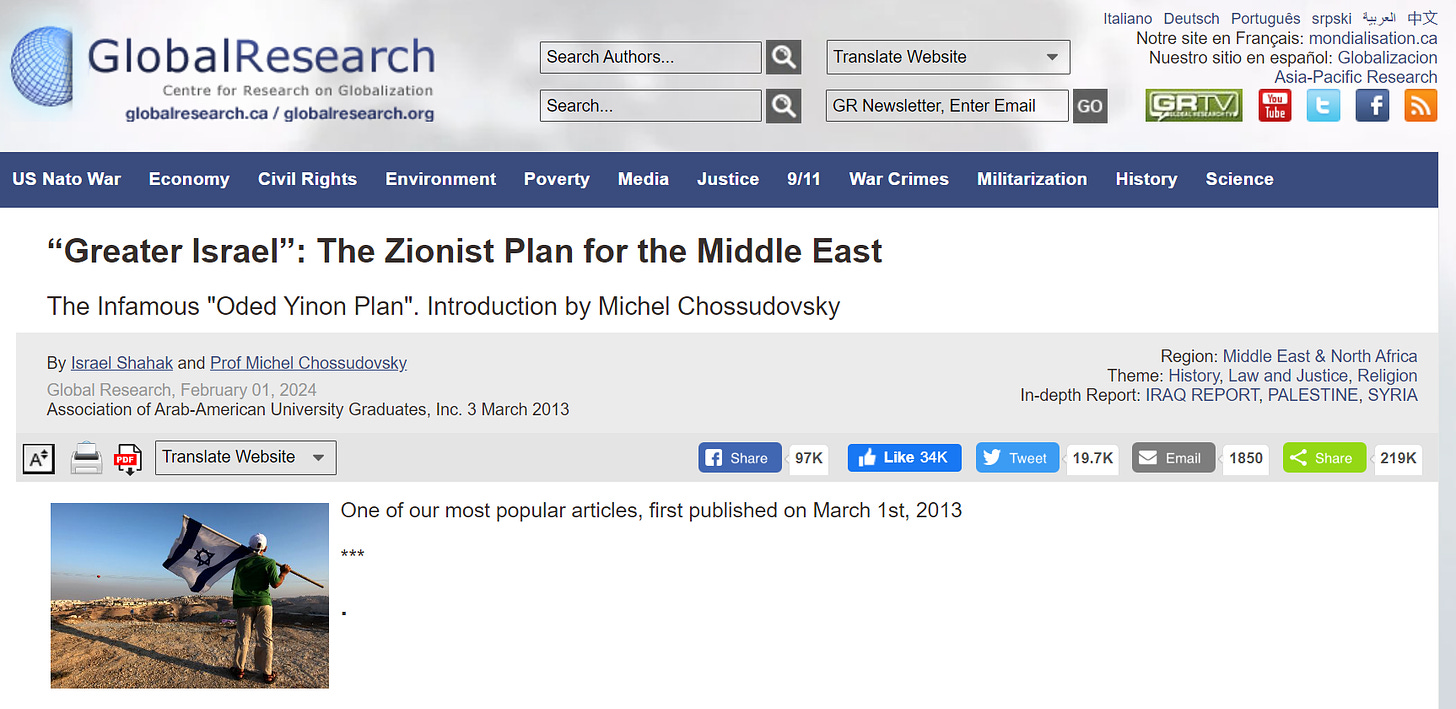
According to Mahdi Darius Nazemroaya in a 2011 Global Research article,The 1982 Yinon Plan was a continuation of Britain’s colonial design in the Middle East:
“The Yinon Plan is an Israeli strategic plan to ensure Israeli regional superiority. It insists and stipulates that Israel must reconfigure its geo-political environment through the balkanization of the surrounding Arab states into smaller and weaker states. [Emphasis added.]
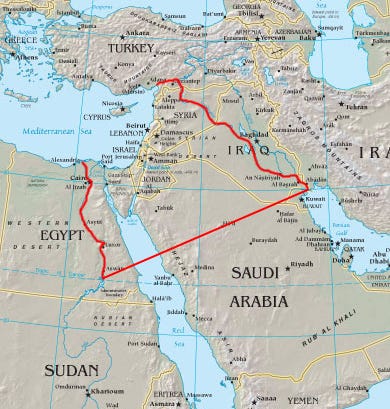
Israeli strategists viewed Iraq as their biggest strategic challenge from an Arab state. This is why Iraq was outlined as the centerpiece to the balkanization of the Middle East and the Arab World. In Iraq, on the basis of the concepts of the Yinon Plan, Israeli strategists have called for the division of Iraq into a Kurdish state and two Arab states — one for Shiite Muslims and the other for Sunni Muslims. The first step towards establishing this was a war between Iraq and Iran, which the Yinon Plan discusses: [Emphasis added.]
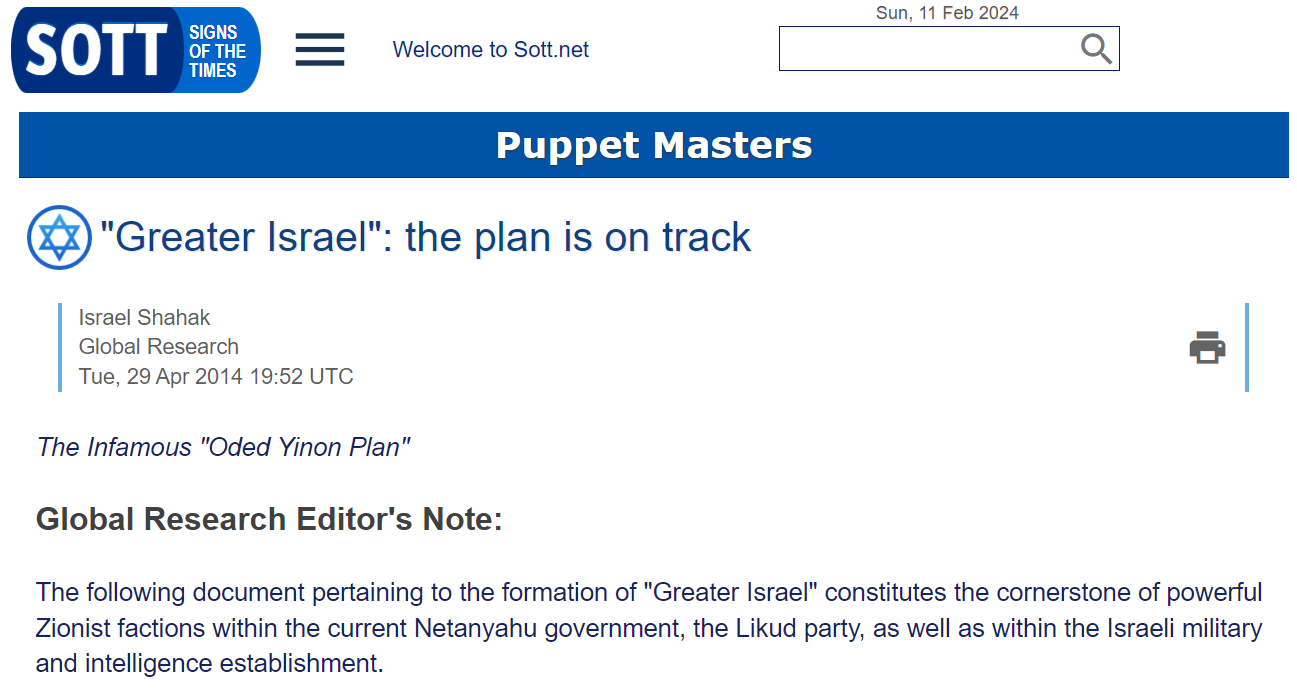
The Atlantic, in 2008, and the U.S. military’s Armed Forces Journal, in 2006, both published widely circulated maps that closely followed the outline of the Yinon Plan. Aside from a divided Iraq. . .the Yinon Plan calls for a divided Lebanon, Egypt, and Syria. The partitioning of Iran, Turkey, Somalia, and Pakistan also all fall into line with these views. The Yinon Plan also calls for dissolution in North Africa and forecasts it as starting from Egypt and then spilling over into Sudan, Libya, and the rest of the region. [Emphasis added.]
Now, recall the 2001 Wesley Clark revelation, noted above in this article, citing the take-down of seven countries in five years. Let’s connect the dots and ask ourselves, “Who runs US foreign policy?”
Let’s look closer at the 1982 Yinon plan in greater detail:
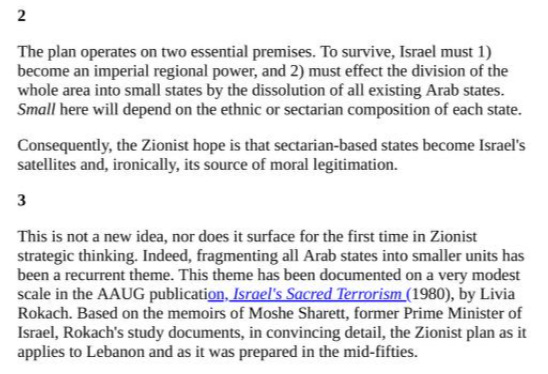
From early on the Likud Party, ruling Israel today, was not concerned at all with the inherent contradictions of their controversial slogan “from the sea to the Jordan there will only be Israeli sovereignty” to their stated aims of peace with the Palestinians:



In fact, major political figures and government institutions in Israel have carried the flame consistently for an expanded Israel. Nation magazine documents that Page 1 of the Likud Party’s founding document (1977) reads:
‘…from the sea to the Jordan there will only be Israeli sovereignty.’ [Emphasis added.]
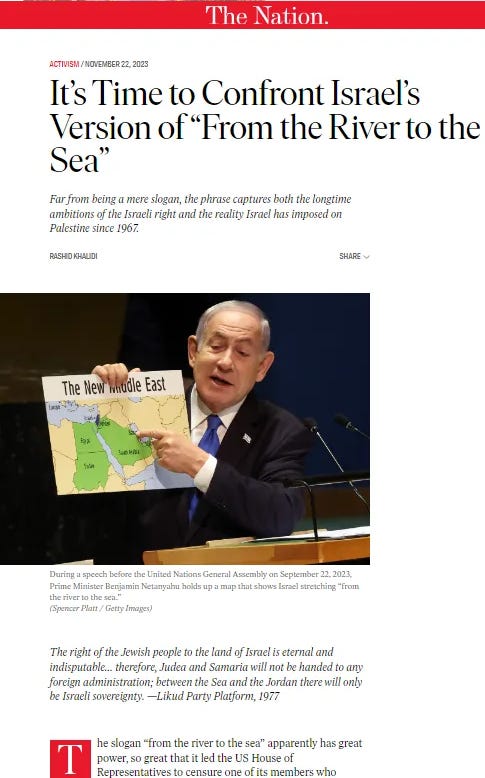
The New York Times has reported that “it is part of normal Israeli discourse to call for Gaza to be ‘flattened,’ ‘erased,’ or ‘destroyed.’” [Emphasis added.] The newspaper even quoted one retired IDF general as having proclaimed that “Gaza will become a place where no human being can exist[.]” Going even further, a minister in the Israeli government suggested dropping a nuclear weapon on Gaza.4 These statements are not being made by isolated extremists, but by senior members of Israel’s government.
In fact, the Finance Minister declared that there is “no such thing as Palestinian people”:

The word “Israel” was first presented in the Bible as a name given to Jacob after he fought an angel. Its meaning was a man who has struggled with God. And is commonly translated as “God Prevails” or “Man seeing God”. Many have argued that the word Israel in the Bible does not refer to a place, but rather a believer or a group of believers in God.
Others believe the land known as Palestine was where the Biblical state of Israel once stood. [Emphasis added.]
Going much, much further, Golda Meir, the Prime Minister of Israel from 1969 to1974 said this about the Palestinians:
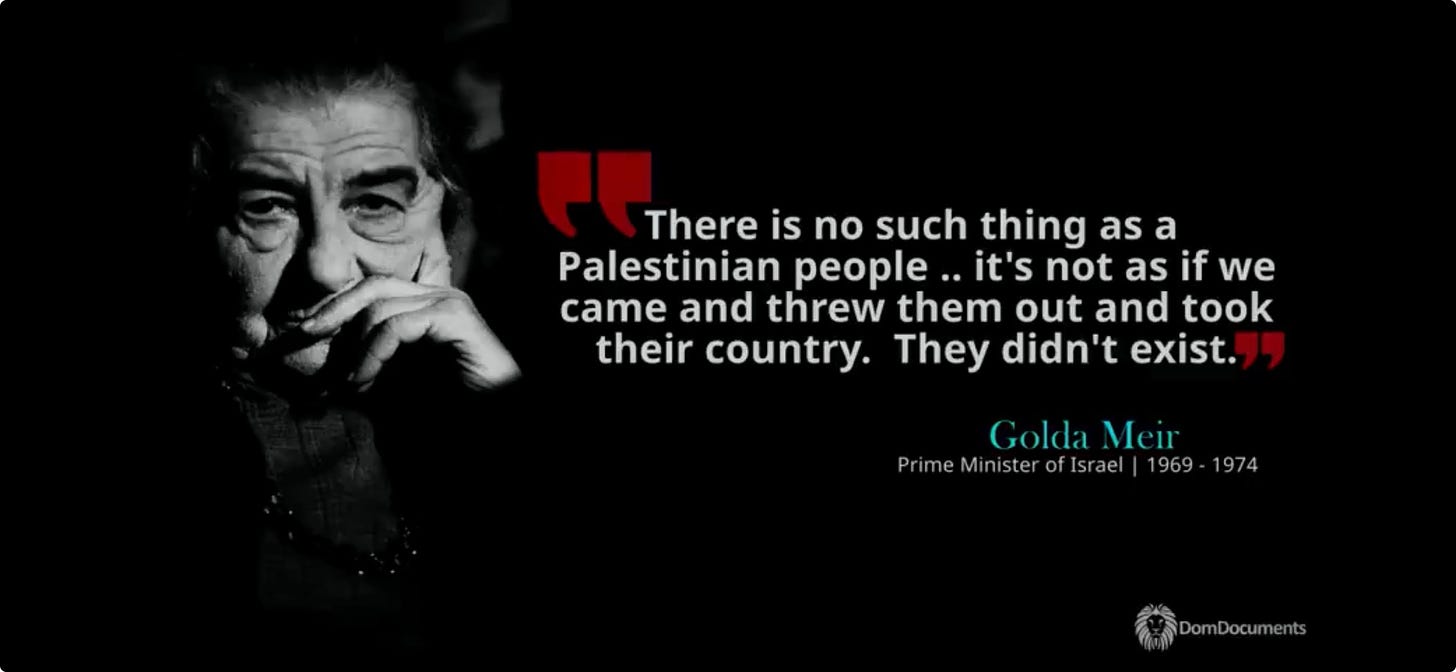
So “Greater Israel” is not just an historical aberration that the Israelis outgrew following statehood. It seems rather, that “The Greater Israel” is a goal that has consistently guided their actions of invasion, occupation and annexation — in spite of their words of peace to their international audience.
Gaza: Off-shore Natural Gas Assets Coveted by Israel
First among the several geo-strategic interests of Israel in Gaza may be the 122 trillion cubic feet of natural gas in fields discovered two decades ago immediately offshore of Gaza — fields that, if not for its Palestinian owners in Gaza, could profit Israel $453 billion as an exporter of natural gas to Europe — especially in the wake of the US-sponsored sabotage of the Nord Stream pipeline. Oil was found in these fields as well — oil worth an estimated $71 billion.
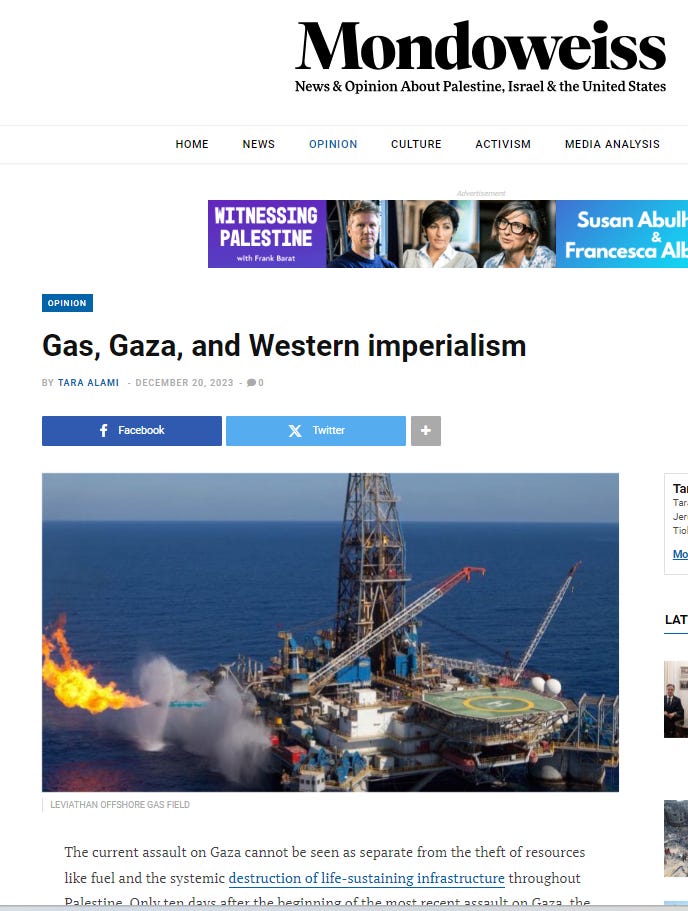
Writer Tara Alami states in an article posted on the American “Mondoweiss”, that “the ongoing Israeli aggression against the Gaza Strip cannot be viewed in isolation from the rich natural gas resources that abound on its shores.” [Emphasis added]
RT covers the story, but Western mainstream media doesn’t touch it, especially now. Russian, Syrian, and Iranian oil has been sanctioned by the West, raising the value of that $71 billion in oil finds even further:

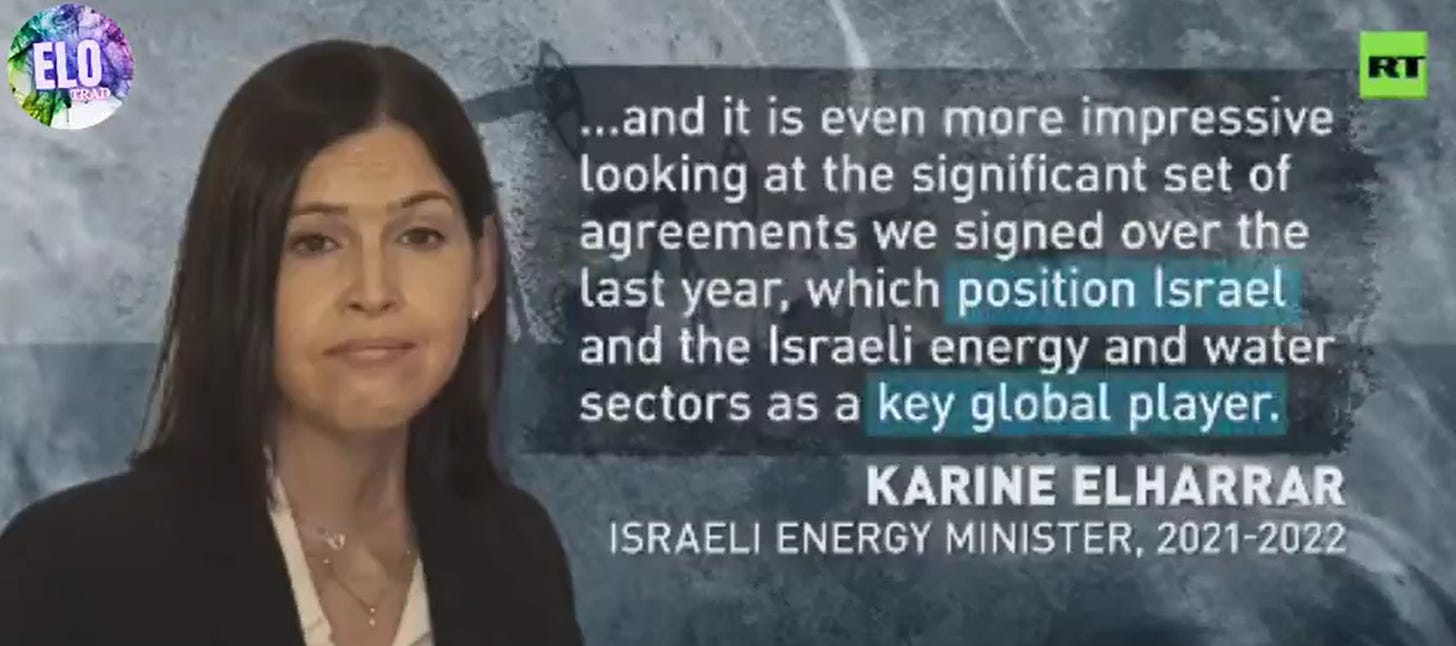
Dr. Atif Kubursi, an emeritus professor of economics from McMaster University who also worked extensively with the United Nations, writes on the IC911 website, “[T]hese [gas] deposits have gained notoriety and value as Russian gas and oil supplies became less available and accessible by Europe, particularly after Nord-Stream II was blown out last year. . .” [Emphasis added]
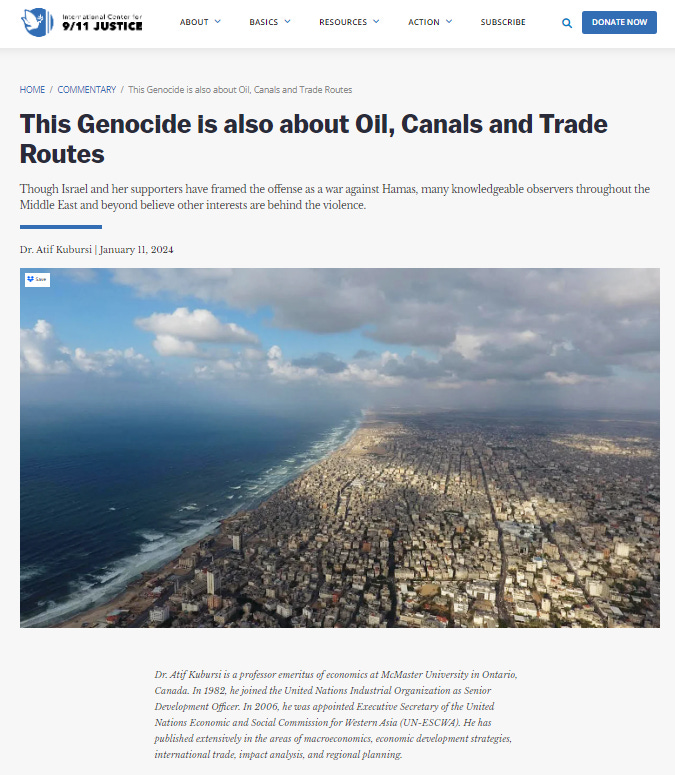
The United States Geological Survey (USGS) estimated a mean (average) of 1.7 billion barrels of recoverable oil and a mean of 122 trillion cubic feet of recoverable gas in the Levant Basin Province.6 This makes the basin one of the most important gas resources in the world. [Emphasis added.]
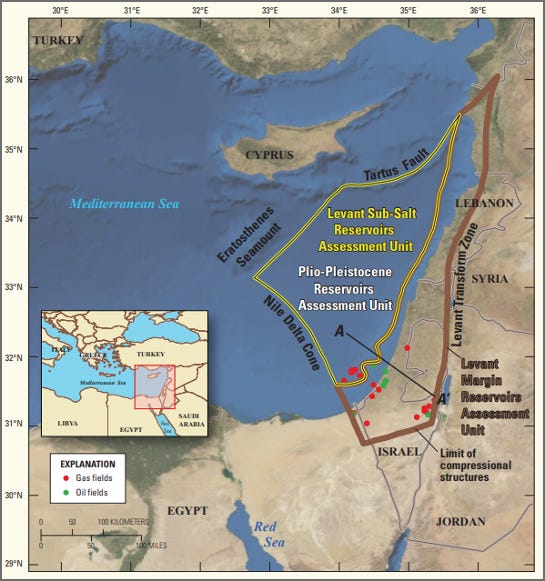
With the escalation of energy prices triggered by the Ukraine-Russia war, the values of these deposits in the Levant basin have measurably increased. It is estimated that these deposits are now worth $2 trillion. Only Israel is currently exploiting these reserves. [Emphasis added.]
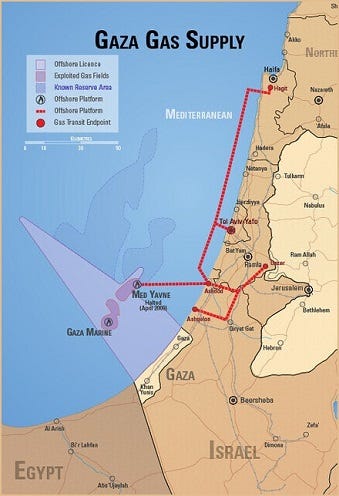
“However, occupation continues to prevent Palestinians from developing their energy fields so as to exploit and benefit from such assets. As such, the Palestinian people have been denied the benefits of using this natural resource to finance socioeconomic development and meet their need for energy. The accumulated losses are estimated in the billions of dollars.” [Emphasis added.]
“This is not only contrary to international law, but also in violation of natural justice and moral law. To date, the real and opportunity costs of the occupation exclusively in the area of oil and natural gas have accumulated to tens, if not hundreds, of billions of dollars.” [Emphasis added.]
Peter Myers cuts to the chase:
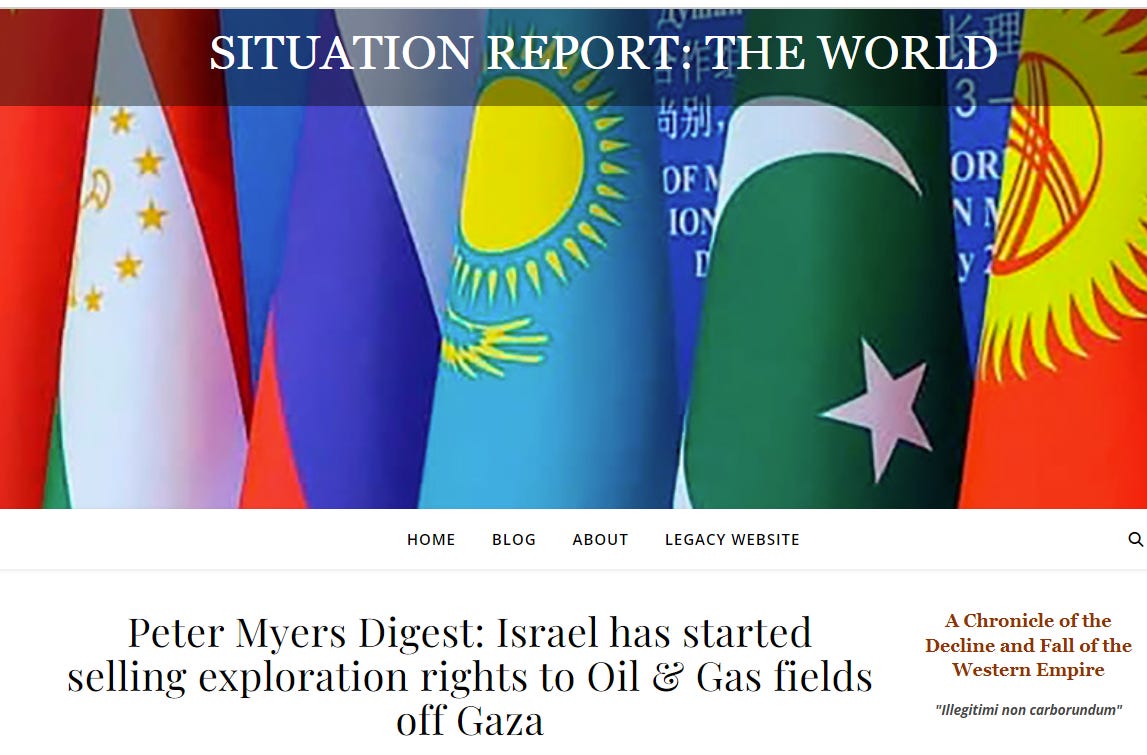
“But Israel has now started selling exploration rights to fossil fuels which belong to the Palestinians. Within days of October 7th they had sold 12 licenses to six different companies. Presumably, they just happened to have the contracts all ready to sign. Usually, these things take months or years to set up but the Israelis were selling half a trillion dollars’ worth of someone else’s oil and gas in less time than it takes to buy a washing machine.” [Emphasis added.]
The United Nations issued a stunning report on this subject, “The Economic Costs of the Israeli Occupation for the Palestinian People: The Unrealized Oil and Natural Gas Potential:
The total oil and gas reserves were valued at a staggering $524 billion in 2019. But Israel does not have sole legal entitlement to the $524 billion, according to a UN report published in the same year. [Emphasis added.]
TRT World reviews the opportunity of the gas fields find for the Palestinian people in this nine-minute report :
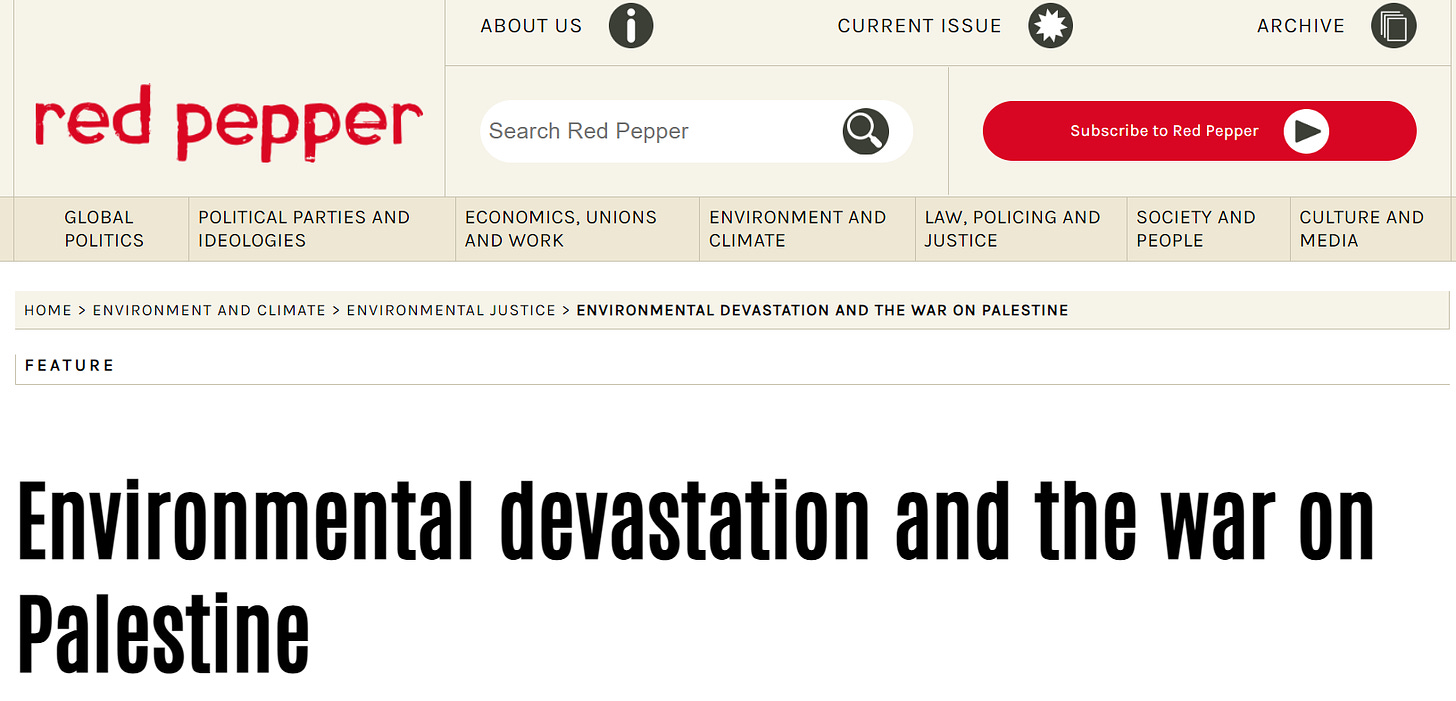
Samira Homerang Saunders
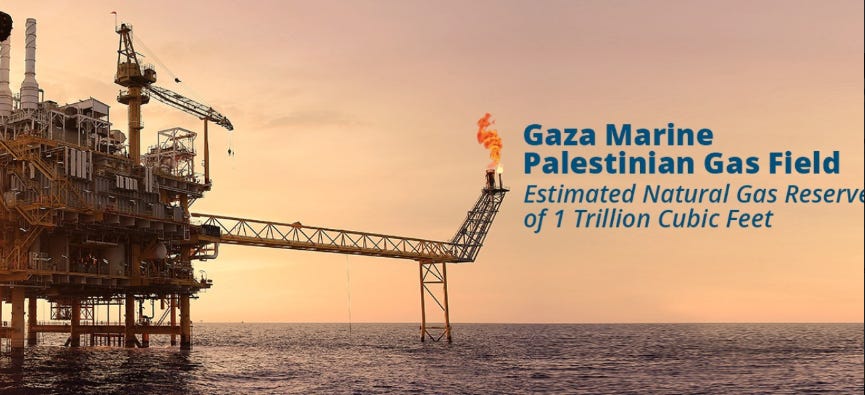
“When Joe Biden’s energy security advisor, Amos Hochstein, visited Israel last week to push for the development of Gaza’s offshore gas reserves. He claimed that the move will ‘revitalize’ the Palestinian economy.
Israel however has no intention of allowing Palestinians to benefit from any of the commercial opportunities it is so keen to pursue. Its government views the entire population as an obstacle.” [Emphasis added.]
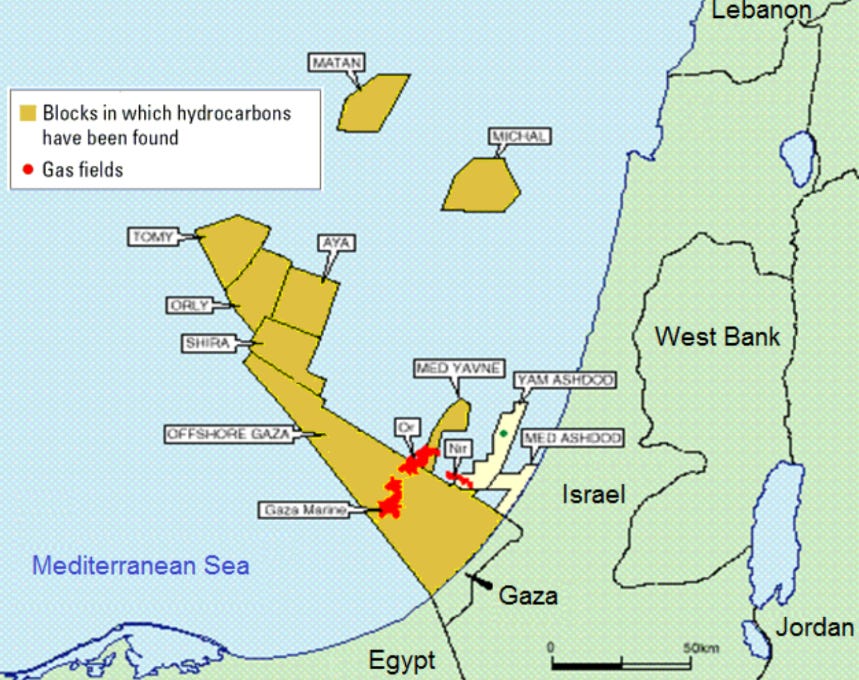
Most all of the Gas finds are inside of the Gazan territorial waters. But since Gaza is now illegally occupied by Israel, including these vast energy resources, there is enormous pressure on Israel to share them with the Palestinians:
The BBC acknowledges the vast opportunity, cites the problems, and interviews Mohammed Shtayyah, head of the Palestinian Economic Council for Development and Reconstruction:

“Israelis even had a joke about how Moses led his people through the desert for 40 years to reach the one place in the region with no oil. But in the past few years, there have been offshore discoveries of gas and possibly oil that look set to open up new economic possibilities. In the future, they could also redefine strategic relationships.” [Emphasis added]
“Leviathan is actually the reservoir that can potentially bring Israel to be totally independent from an energy perspective and also position Israel as an exporter of natural gas rather than importer,” says Yossi Abu, chief executive of leading Israeli natural gas company, Delek Drilling.
Delek Drilling and Avner Oil Exploration, also owned by Delek Group, own 31% of Tamar and 45% of Leviathan. Its US partner is Noble Energy.
“There are some technical problems but the problems are mainly political – because of the Israeli occupation and the internal Palestinian problems – the need for reconciliation,” says Mohammed Shtayyah, head of the Palestinian Economic Council for Development and Reconstruction.
“Overall it is extremely frustrating for us as Palestinians. You have that natural resource there that should be a real wealth for the nation and [we are] not using it.” [Emphasis added.]
See this.
The Jewish News Syndicate provides the Israeli perspective, blaming the Palestinian leader for the lack of progress:




